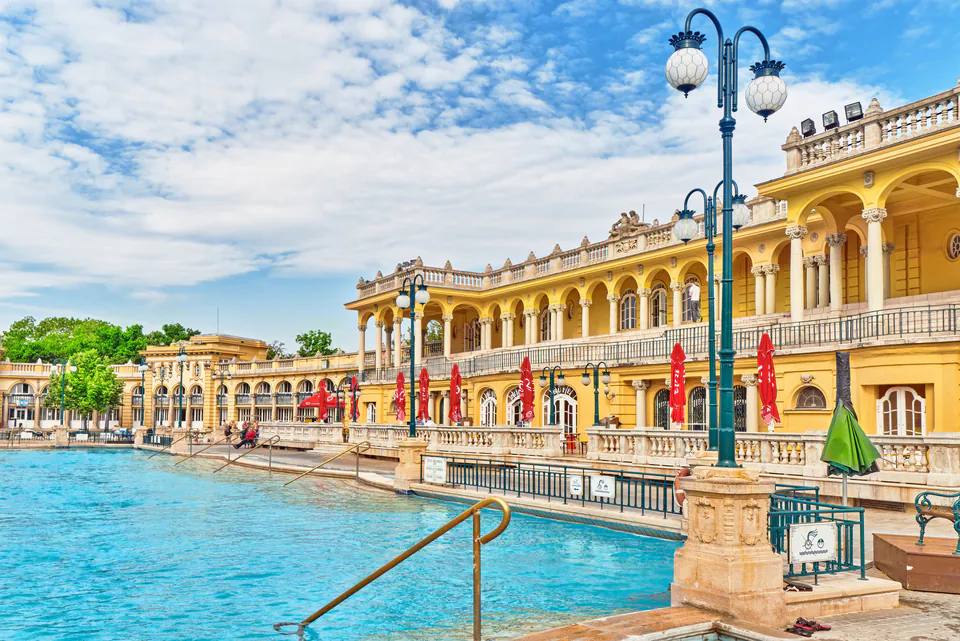Etiquette for Visiting Budapest's Thermal Baths
You're standing outside one of Budapest's famous thermal baths. Steam is coming up from old pools. Locals are chatting quietly in the mineral water. These places aren't just for swimming. They're pieces of Hungarian history where old traditions meet modern wellness. Whether you're going to Széchenyi's big outdoor pools or the Turkish style of Rudas, knowing the right etiquette makes your visit way better.
Budapest's thermal baths have unwritten rules that locals have used for generations. These aren't random rules. They're about respect, staying clean, and understanding that these special places belong to everyone. Get these right, and you'll move through your bath visit like you've lived in Budapest your whole life. Locals will nod at you with approval and you'll have a much better time.
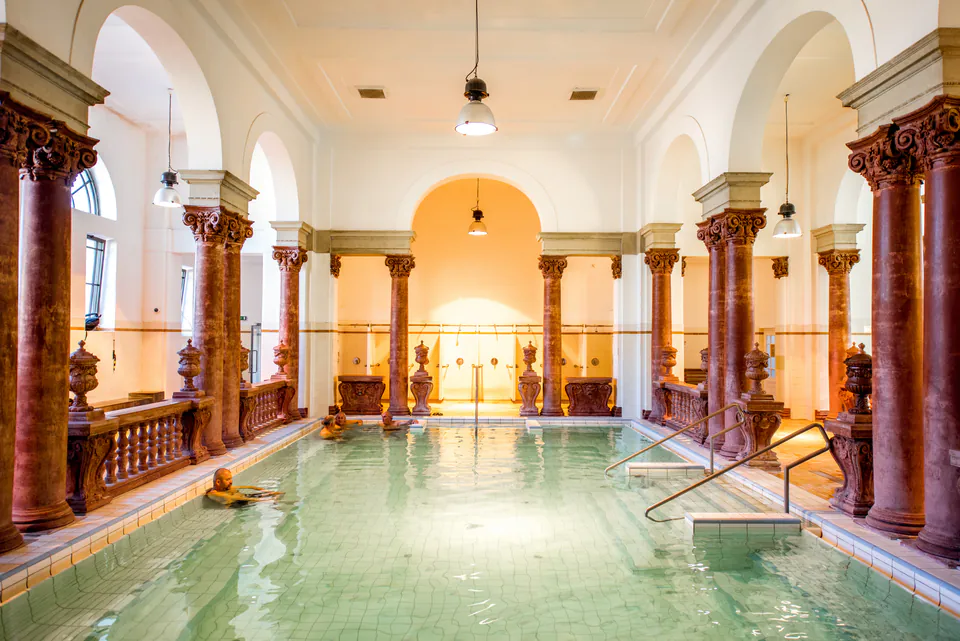
Getting Ready Before You Go
Your thermal bath experience starts way before you get in the water. Being prepared means you'll spend time relaxing instead of running around looking for stuff you forgot.
What to Pack for the Baths
What you bring can make your experience amazing or pretty frustrating. Most baths let you rent things, but bringing your own stuff is usually cheaper and more comfortable.
You absolutely need a swimsuit. Any style that's comfortable works fine. Flip-flops or pool shoes are just as important for staying clean and safe. Those wet floors can be really slippery. For your towel, we always recommend those quick-dry travel ones. They work great in these places, but regular towels are fine too.
Swim caps are required in some lap pools but you don't need them for the thermal pools. We learned this the hard way when we showed up at Lukács without one and couldn't use the swimming lanes. Check the rules before you go. Soap or shower gel is a must because you have to shower before getting in any pool. This isn't optional.
Smart extras include a waterproof bag for your phone and small stuff, though be careful around the pools. A water bottle helps you stay hydrated during your soak. Hair ties keep long hair out of the way and show you're being considerate of other people.
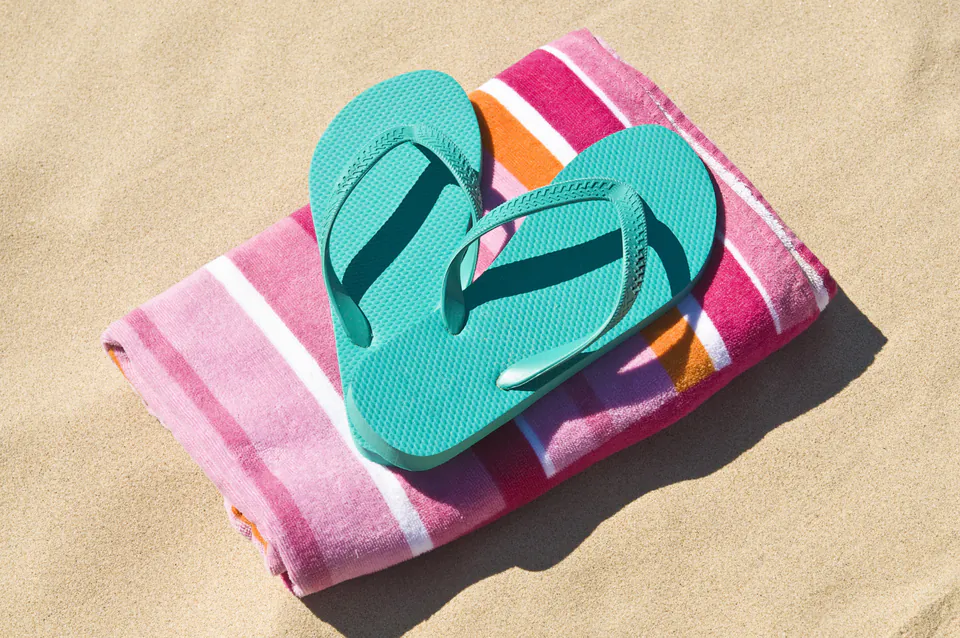
Getting Your Tickets
Buying online saves you from waiting in lines and you can often pick your locker or cabin ahead of time. We always do this through the official websites or good third-party sites. This is really helpful during busy times when places like Széchenyi can have huge lines.
Buying tickets there still works but you might wait a while during busy times. Weekends and holidays are the worst for lines, so booking ahead really pays off.
Ticket types usually include all-day access to the main pools, saunas, and steam rooms. The main choice is between a locker (smaller storage in shared changing rooms) or a private cabin (your own changing room with storage). Couples often share cabins, which makes them cheaper for two people and gives you more privacy and space.
Picking Your Bath
Each Budapest bath is different, and choosing the right one makes your visit much better.
Széchenyi Thermal Bath is huge with lots of outdoor pools. It's lively and social. They have these crazy "Sparties" (spa parties) on some Saturday nights that completely change the whole vibe.
Gellért Thermal Bath has incredible Art Nouveau architecture with beautiful tiles and an elegant feel. This one is perfect if you want something that looks amazing while you relax.
Rudas Thermal Bath has this amazing 16th-century octagonal Turkish pool. During the week it's either men-only or women-only depending on the day, but weekends are for everyone. The rooftop pool has incredible city views.
Lukács Thermal Bath is where locals go. It has strong medicinal properties and feels more clinical. It's less touristy and has good lap swimming if you want to actually swim.
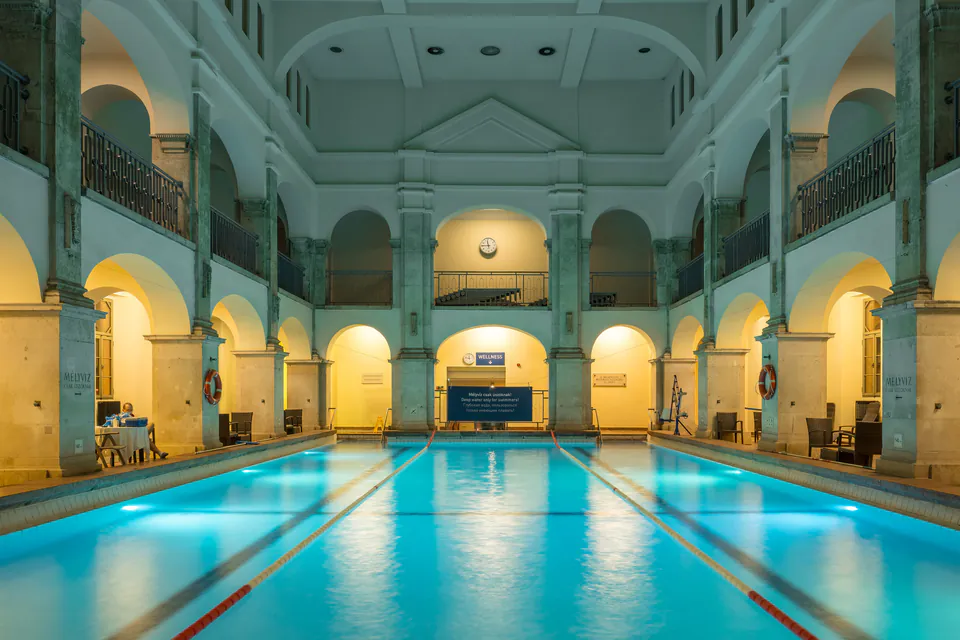
How to Act at the Baths
Once you're inside, what you do affects everyone else's experience. Budapest's bath culture is all about respecting each other, staying clean, and keeping things relaxed so people can heal and unwind.
The Mandatory Pre-Bath Shower
This is the most important rule at Budapest thermal baths. You have to take a complete shower with soap, totally naked (no swimsuit), before you get in any pool. This isn't a suggestion. It's required and everyone has to do it to keep the water clean for everyone.
We can't stress this enough. This keeps the mineral water clean and therapeutic. When everyone removes sweat, oils, and other stuff, it helps preserve the natural feel and healing qualities that make these waters special. When everyone follows this rule, they don't need as many harsh chemicals, which keeps the authentic thermal experience that people come for.
The shower areas in the changing rooms have everything you need. Don't think of it as annoying. It's your part in a tradition of communal wellness that's been going on for centuries.
How to Behave Around the Pools
Thermal baths are places for relaxation where being considerate means everyone can enjoy the healing benefits. Keep noise down, especially indoors and in saunas that are supposed to be quiet. Talking is fine but keep it at normal levels so you don't bother people who want peace and quiet.
Moving around pools needs to be careful and polite. Always walk, don't run on surfaces that might be slippery. You can't jump or dive into pools for safety reasons. Don't splash too much and give people their personal space, especially when pools are crowded.
Public displays of affection should stay modest. Holding hands or quick hugs are totally fine, but remember these are family-friendly public places where being discreet is appreciated.
Taking photos needs careful thought about other people's privacy. Taking pictures of the amazing architecture or selfies is usually okay in main pool areas, but don't photograph other people without asking them first. Photography is completely forbidden in changing rooms and often not allowed in saunas. Always check the posted rules and be careful.
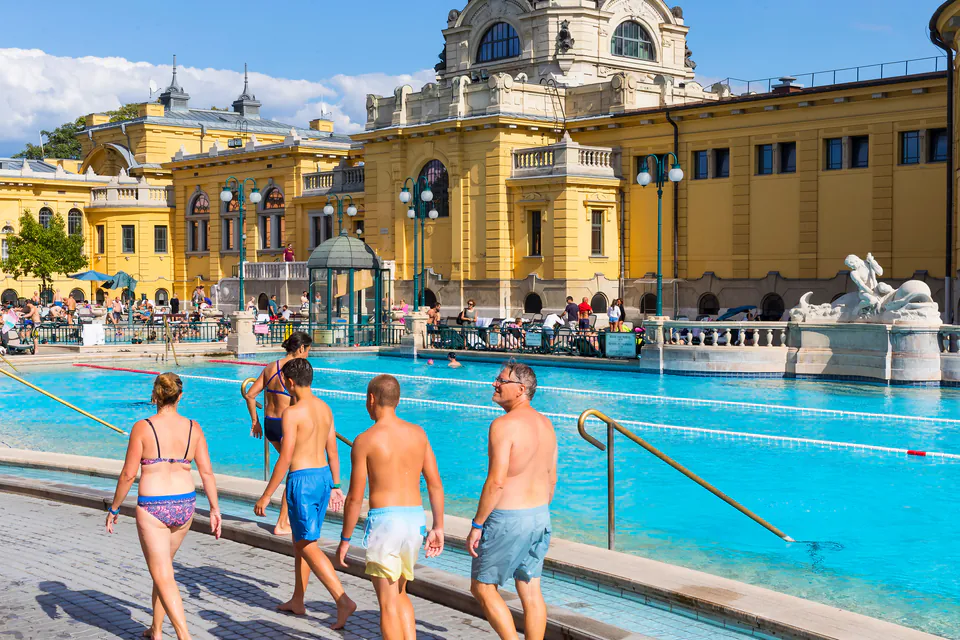
Finding Your Way Around
Most baths give you either lockers (smaller storage in shared changing rooms) or private cabins (individual changing rooms with storage). Understanding this system prevents confusion and delays.
When you enter, you'll get an electronic, waterproof wristband that's your key to your assigned locker or cabin. This same thing controls the entry and exit gates and often lets you buy stuff at cafes without cash. Keep this wristband on tight during your whole visit. We once saw someone lose theirs and it was a real hassle to get out.
It's pretty cool how they've added modern technology to these historic places. Staff usually show you how the wristband works, but don't be shy about asking if you're confused.
Big places like Széchenyi can feel like a maze at first. Take a minute to look at the maps or signs, which are usually in Hungarian and English. Asking staff for directions is totally normal and they're used to it. "Merre van a...?" means "Where is the...?" in Hungarian.
Health and Safety Stuff
Thermal bathing has lots of benefits, but being responsible keeps you safe and makes sure you have a good time. The warm, mineral-rich water can affect your body differently than regular pools.
Staying Hydrated and Managing Your Time
Drinking lots of water is really important when you're soaking in hot thermal water. The high temperatures can dehydrate you faster than you think. Drink plenty of water before, during, and after your visit. Most baths have water fountains or sell bottled water.
Time limits in hot pools are serious. Pools over 38°C (100°F) should only be used for 15-20 minutes at a time with breaks to cool down between sessions. Listen to your body. If you feel dizzy, nauseous, or really tired, get out of the hot water and rest.
Medical stuff applies to people with heart problems, blood pressure issues, or pregnancy. Talk to your doctor before visiting if you have existing health conditions. Some pools have signs about medical conditions because of the high temperatures and mineral content.
Kids and thermal water need special attention. Really hot pools often have age limits or aren't recommended for young children because they can't control their body temperature as well as adults. Many bigger baths have family sections with cooler water made specifically for younger kids.
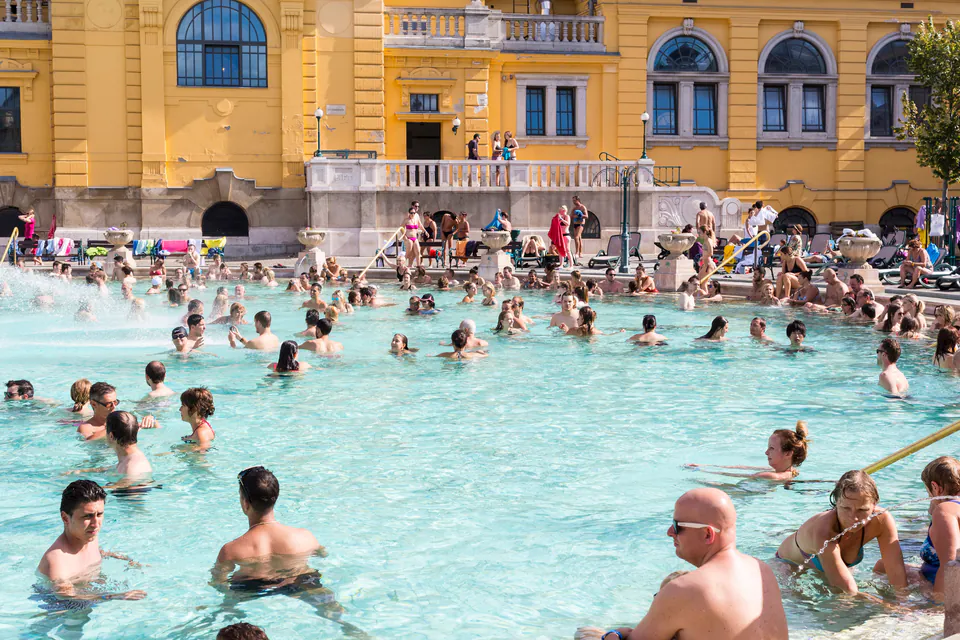
Alcohol and Thermal Bathing
Don't drink alcohol before and during thermal bath visits. Alcohol makes dehydration worse and messes with your judgment, which can be dangerous in hot water. Mixing alcohol, heat, and mineral-rich water can make you dizzy, faint, or cause other serious problems.
Quick Etiquette Reference
Essential Bath Etiquette Do's and Don'ts
| DO | DON'T |
|---|---|
| Shower thoroughly with soap before entering any pool | Skip the pre-bath shower – it's mandatory! |
| Wear flip-flops when walking around | Walk barefoot in communal areas |
| Keep noise levels respectful, especially indoors | Be overly loud or boisterous |
| Respect personal space in pools | Engage in excessive public displays of affection |
| Stay hydrated – drink plenty of water | Bring glass containers into pool areas |
| Limit time in very hot pools (15-20 minutes) | Run, jump, or dive into pools |
| Check swim cap rules for specific pools | Take photos of others without permission |
| Keep your electronic wristband secure | Forget to use footbaths where provided |
Pro Tips for Better Bath Visits
Making your thermal bath experience go from good to amazing takes insider knowledge and smart planning.
When to Visit
Early morning on weekdays gives you the most peaceful experience with fewer crowds and a more authentic local feel. We always recommend this if you can manage it. Late-night bathing at places like Rudas on weekends is magical under the stars, though it depends on the season and which bath you're visiting.
Going beyond the main pools shows you hidden gems in bigger complexes. Most places have multiple indoor pools with different temperatures, mineral mixes, and atmospheres. Taking time to find these lesser-known areas often gives you more peaceful spots and unique architecture.
Sauna and Steam Room Rules
Sauna rules include showering before and after, sitting or lying on a towel so your body doesn't touch the wooden benches directly, and keeping conversations quiet and respectful. Many European saunas have specific customs about towel placement and behavior that make everyone more comfortable.
Steam room rules are similar to sauna etiquette but you need to pay attention to the humid environment. These spaces usually encourage quiet thinking and short visits so you don't overheat.
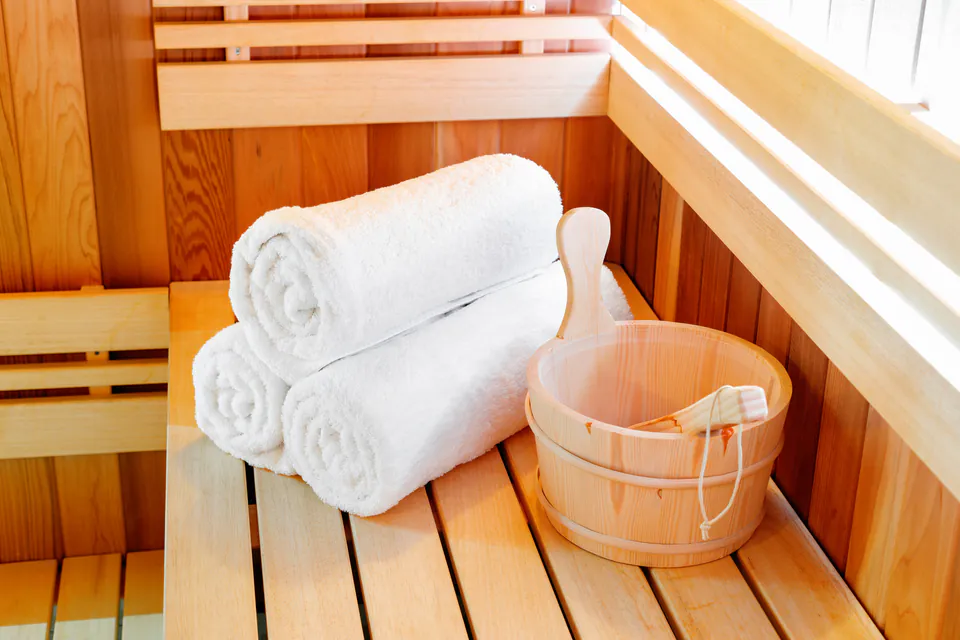
Hot and Cold Therapy
Going between hot and cold is a traditional practice where you move between hot pools or saunas and cold plunge pools. This "thermal shock" is supposed to boost circulation and give you energizing health benefits. Start slowly and always listen to how your body feels.
Extra Services and Treatments
Many baths have massage services, mud treatments, and special spa therapies for extra money. We recommend booking these ahead of time, especially during busy periods, to make sure they're available and so you can plan better around your general bathing time.
Fitting in with Local Culture
Watching how locals behave gives you valuable insights into unwritten customs and how to enjoy the baths better. Notice how regulars move between pools, their timing patterns, and how they interact socially. Learning basic Hungarian phrases like "köszönöm" (thank you) or "jó napot" (good day) shows respect for local culture and staff and locals usually appreciate it.
Taking your time is probably the most important advanced strategy. Don't rush through your thermal experience. Give yourself at least 2-3 hours, or even half a day, to really absorb the healing benefits and cultural richness these amazing places have.
